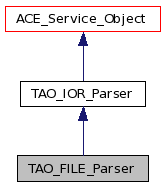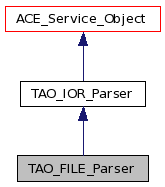Implements the <file:> IOR format. More...
#include <FILE_Parser.h>


Public Member Functions | |
| virtual | ~TAO_FILE_Parser (void) |
| The destructor. | |
| virtual bool | match_prefix (const char *ior_string) const |
| virtual CORBA::Object_ptr | parse_string (const char *ior, CORBA::ORB_ptr orb) |
Implements the <file:> IOR format.
This class implements the <file:> IOR format. It is dynamically loaded by the ORB and used to open a file, read its contents and then interprete the file as an IOR (that can be in any valid format).
Definition at line 40 of file FILE_Parser.h.
| TAO_FILE_Parser::~TAO_FILE_Parser | ( | void | ) | [virtual] |
| bool TAO_FILE_Parser::match_prefix | ( | const char * | ior_string | ) | const [virtual] |
Return true if ior_string starts with a prefix known to this IOR parser
Implements TAO_IOR_Parser.
Definition at line 30 of file FILE_Parser.cpp.
{
return (ACE_OS::strncmp (ior_string,
::file_prefix,
sizeof (::file_prefix) - 1) == 0);
}
| CORBA::Object_ptr TAO_FILE_Parser::parse_string | ( | const char * | ior, | |
| CORBA::ORB_ptr | orb | |||
| ) | [virtual] |
Parse the ior argument and return an object reference. The call may raise the standard system exceptions (NO_MEMORY, INV_OBJREF, etc.)
Implements TAO_IOR_Parser.
Definition at line 38 of file FILE_Parser.cpp.
{
// Skip the prefix, we know it is there because this method in only
// called if <match_prefix> returns 1.
const char *filename =
ior + sizeof (::file_prefix)+1;
FILE* file = ACE_OS::fopen (ACE_TEXT_CHAR_TO_TCHAR (filename),
ACE_TEXT("r"));
if (file == 0)
return CORBA::Object::_nil ();
ACE_Read_Buffer reader (file, true);
char* string = reader.read ();
if (string == 0)
return CORBA::Object::_nil ();
CORBA::Object_ptr object = CORBA::Object::_nil ();
try
{
object = orb->string_to_object (string);
reader.alloc ()->free (string);
}
catch (const ::CORBA::Exception&)
{
reader.alloc ()->free (string);
throw;
}
return object;
}
 1.7.0
1.7.0